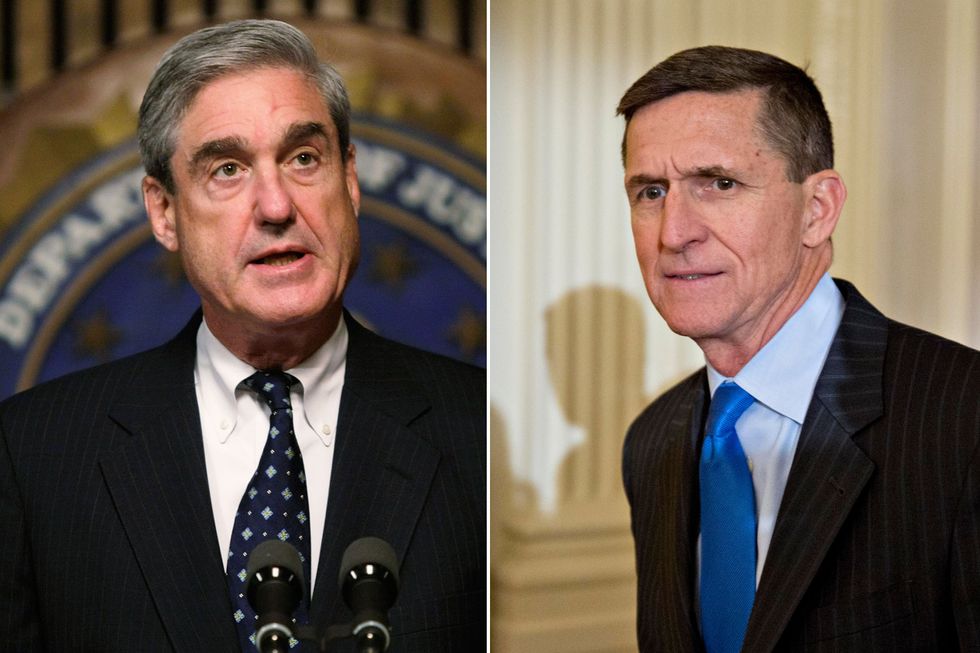Former Trump Administration National Security Adviser Michael Flynn’s plea deal with prosecutors in special counsel Robert Mueller’s Russia probe has led to a "between-a-rock-and-a-hard-place" moment for President Donald Trump — one that leaves him with two choices, each with clear, significant risks.
Michael Flynn, who was Trump’s national security adviser for the first 24 days and was also a top campaign adviser, has admitted to lying to the FBI about two separate conversations with the former Russian Ambassador to the United States, Sergey Kislyak, in December 2016.
Now here’s where this all ties to the Oval Office: Flynn told investigators that “a very senior member” of Trump’s presidential transition team ordered him to make the occurred contact with Russian government officials — in other words, Flynn is currently claiming he was simply following orders when he went to talk to the Russians, not acting on his own accord.
This means that Flynn’s plea deal and cooperation with the Mueller investigation could potentially implicate senior-ranking members of Trump’s inner circle, and possibly the president himself, in, to say the very least, some very questionable behavior.
Reports have even suggested that Trump’s senior adviser and son-in-law Jared Kushner may have been one of the senior officials of the transition team who directed Flynn to speak to the Russians, which if proven true, would worsen the situation for the President.
At this point, Trump has two roads to walk down: distance himself and try to make this incident go away as soon as possible, or just try to minimize the potential damage. In other words: betray Flynn or fire Mueller.
The second path Trump could take is to fire special counsel Mueller. This plan would in effect be an attempt to end the probe altogether and prevent Mueller from using Flynn’s cooperation to build a case against the president, his family, or other top aides in the future. Supposedly, Trump has mused about firing Mueller before, but held off, in part because senior lawmakers from both parties have warned him of serious and immediate consequences if he chose to do so.
To many establishment Republicans, the prospect that Trump would fire Mueller is unimaginable. Senator Bob Corker (R-TN) went on record to state how such an event would be unimaginable. But now that Flynn is cooperating with the investigation, firing Mueller sure seems like a reasonable path to take despite the outcry it would receive from Democrats and even some Republicans.
All this said, however, getting rid of Mueller might not prove to be so easy. That’s because Deputy Attorney General Rod Rosenstein told Congress back in June that he interpreted the official special counsel regulation to mean that he is the only person in government with the authority to fire Mueller, leaving the president void of this authority. Furthermore, Rosenstein stated that he would only fire Mueller for “good cause,” and would refuse to carry out an order from the president to fire Mueller if his opinions of a good cause were not established.
This being said, it seems very doubtful, even to the laxest observer, that Trump attempting to fire Mueller would have no correlation to his desire to ensure the legal security of members of his administration, family, or himself. This means Trump would have to fire Rosenstein — and perhaps several more Justice Department officials — until he found one willing to carry out his order.
If Trump were to decide to carry out with said plan, the series of actions would prove highly controversial and possibly even spark a constitutional nightmare. Throughout the entire process, Trump would purposely be trying to kill an investigation that could charge him, his family members, or his close associates with crimes, with all this being blatantly known to the American people. That would mean he would effectively be putting his personal interests above the law; and under the constitution, everyone is equal under the law, including the President.
To preemptively prevent such a scenario from occurring in the first place, Senators from both side of the aisle including Sen. Thomas Tillis (R-NC) and Sen. Chris Coons (D-DE) have proposed a bill that would in effect protect Mueller if such a scenario were to arise and overall prevent such a scenario from occurring.
Speaking to CNN in August, Tillis stated, explaining his proposed bill, "The President would maintain the power to remove the special counsel, but we would just want to make sure that it had merit and have that back-end judicial process...And if there is a termination, we just want to make sure, through judicial review, that it was warranted."“It’s now more important than ever that Special Counsel Mueller is able to continue his investigation without interference, and I am continuing to work on bipartisan legislation to protect the special counsel from being fired without cause,” Coons said in a statement on Friday to the press.
With Congress yet to pass such a bill, however, Trump could still fire Mueller and potentially provoke an all-out showdown between the White House and the Justice Department. With a

















